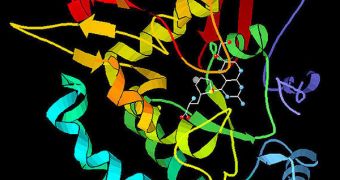Young athletes – more than other groups – are at risk of experiencing sudden cardiac death, mostly from a condition called cardiac hypertrophy. Now, experts have identified a critical enzyme, that may be used to reduce this risk significantly.
The molecule could be administered to this population subgroup ahead of rigorous training sessions or stressful and demanding competitions, thus ensuring they don't get hurt, AlphaGalileo reports.
Cardiac hypertrophy is a condition characterized by the reduction of the heart's blood-pumping volume, and also by the shrinking of the heart chamber. It mostly affects heart muscles, portions of which thicken for no apparent reason.
Previous studies have associated this condition with high blood pressure, or hypertension, as well as with excessive exercises. This is why young athletes are most affected by this condition.
Irregular heartbeats called arrhythmias are also common symptoms. Cardiac diseases that degenerate from these off-tempo beats of the heart result in millions of deaths around the world every year.
But preventing arrhythmias is possible, as demonstrated in the new study by researchers with the University of Manchester, in the United Kingdom. Using laboratory experiments and computer simulations, they found that the enzyme MKK4 may protect against this condition.
In the human body, this molecule is involved in controlling and preventing arrhythmias, mostly by influencing another protein. The latter forms an electrical bridge between adjacent heart cells.
This ensures that the electrical excitation wave which causes the heart to beat in tune is properly transmitted from one cells of the heart muscle to the other. When this system works, the result is a synchronized mechanical contraction of the heart that produces a regular, healthy heartbeat rhythm.
“Using experimental measurements together with detailed computer models, we were able to simulate the electrical activity in cardiac tissue with disrupted electrical coupling between adjacent cardiac cells,” UM Faculty of Life Science expert Dr Xin Wang says.
Details of the new investigation appear in the latest issue of the esteemed Journal of Biological Chemistry. The main conclusion of the work is that reduced concentrations of MKK4 in the heart tissue increase the risk of adverse, even lethal, cardiac events.
“The information generated from this study will help us to identify whether the MKK4 enzyme could become a therapeutic target for the treatment of cardiac arrhythmias in association with cardiac hypertrophy,” Wang explains.
“This research means it would be possible to identify the most important factor behind the sudden cardiac death associated with cardiac hypertrophy, which can affect people of any age with hypertension and also healthy well-trained athletes,” adds Henggui Zhang.
The expert, a coauthor of the new study, is also a biophysicist at the UM School of Physics and Astronomy.

 14 DAY TRIAL //
14 DAY TRIAL //